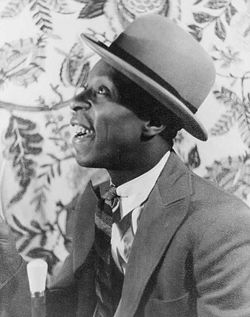John Bubbles (John William Sublett)

John Bubbles was born in Louisville, Kentucky on February 19, 1902, but soon moved with his family to Indianapolis. There, he formed a partnership with Ford L. “Buck” Washington known as “Buck and Bubbles,” with Buck playing stride piano and singing while Bubbles tapped, beginning in 1919. The two appeared in the Ziegfeld Follies of 1931 and were the first black artists to appear at the Radio City Music Hall. On November 2, 1936, they performed live in the inaugural program of the world’s first scheduled ‘high definition’ (240-line or better) television service at Alexandra Palace, London, and may thus be said to be the first black artists in television history. John Bubbles is known as the father of “rhythm tap”, a form of tap dance. As opposed to the tap dancing of Bill Robinson (Bojangles) who emphasized clean phrases and toe taps, Sublett brought in percussive heel drops and played with the traditional eight-bar phrase, slowing it down to allow for more rhythmic freedom. He thus merged the art of tap dancing with the new improvisatory style of jazz, reinventing the tap art form. Though unable to read music, Bubbles was chosen by George Gershwin to create the role of Sportin’ Life in his opera Porgy and Bess in 1935. Sublett performed the role occasionally for the next two decades. In 1963, in a studio recording of Porgy and Bess featuring Leontyne Price and William Warfield, he performed Sportin’ Life’s two main arias from the opera, “It Ain’t Necessarily So” and “There’s A Boat Dat’s Leavin’ Soon For New York”. (Ironically, he did not perform these songs on the so-called “original cast” album, recorded in 1940.)
In 1920 John Bubbles gave lessons in tap dancing to Fred Astaire, who considered Sublett the finest tap dancer of his generation. In the number “Bojangles of Harlem” from Swing Time (1936) Astaire dresses in blackface as the Sportin’ Life character and dances in the style of Sublett while ostensibly paying tribute to Bill Robinson. During the Vietnam War, John Bubbles toured the war zone with the USO. In 1965, he appeared with Eddie Fisher on a USO tour, visiting many outposts and camps in the early war years. He appeared with Judy Garland in her 1967 concert at the Palace Theatre, singing “Me And My Shadow.” In 1978, John Bubbles spoke at the Variety Arts Theatre in Los Angeles as a participant in a seminar on vaudeville. Someone asked him who the best tap dancer was. Bubbles answered, “You’re looking at him.” Then he added, “Honestly, if I had to name the best dancer, it would be Fred Astaire. He could tap. He had a good teacher. But he could ballroom, dance with a partner. All in all, he’s the best.” That same night, Bubbles mentioned that Astaire had brought him into the rehearsal hall to work on “Bojangles of Harlem” and John’s chops are right there in the number. John Bubbles died on May 18, 1986, at his home in Baldwin Hills, California.
Born
- February, 19, 1902
- USA
- Louisville, Kentucky
Died
- May, 18, 1986
- USA
- New York, New York
Cemetery
- Green Hills Memorial Park
- Rancho Palos Verdes, California
- USA



